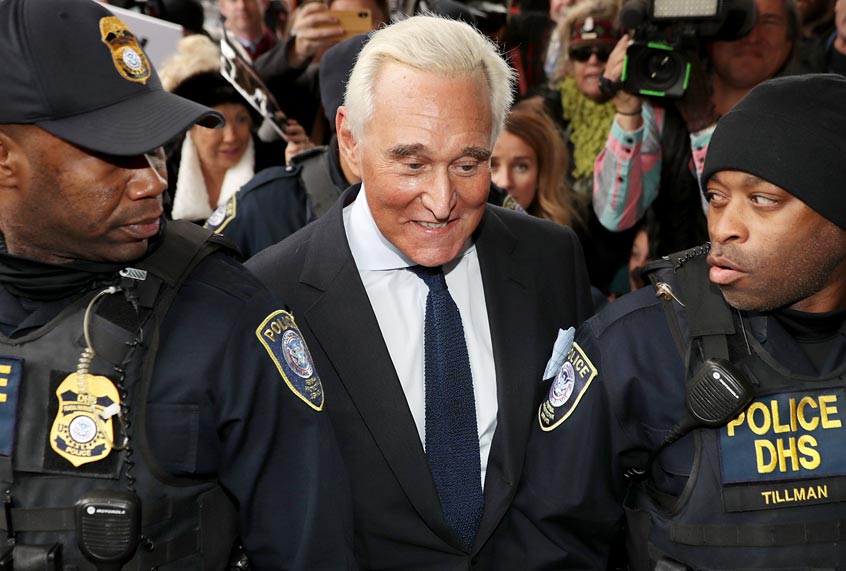Roger Stone, a longtime associate and informal adviser to President Donald Trump, pleaded not guilty Tuesday morning to seven criminal charges of making false statements, witness tampering and obstruction of justice.
Special counsel Robert Mueller and the U.S. attorney for the District of Columbia have accused Stone of lying to congressional investigators about his alleged attempts to find out when potentially damaging emails stolen from Hillary Clinton’s presidential campaign would be published by Julian Assange, the publisher of the whistleblower website WikiLeaks whom Stone previously called “my hero.” Prosecutors have said Russian intelligence agents hacked Democrats and their email accounts and then shared them with WikiLeaks, which published them during the final months of the 2016 election.
No changes were made to Stone’s bail, which had been set last Friday after his arrest at $250,000 and his travel is limited to Florida, New York, Virginia and Washington, D.C., CNN reported. Stone will appear in court again on Friday before District Judge Amy Berman Jackson, who is handling several of the major Mueller cases, including the guilty plea of former Trump campaign chairman Paul Manafort.
Stone has already appeared in federal court once in Florida, following the early morning arrest at his Fort Lauderdale home. A team of armed law enforcement officials raided his home just after 6 a.m. ET on Friday citing concerns that he might flee or destroy evidence.
CNN producer @davidgshortell describes the moment Roger Stone was taken into custody by the FBI. The longtime Donald Trump associate has been indicted by a grand jury on charges brought by special counsel Robert Mueller https://t.co/wUJEIkKDTw pic.twitter.com/AJ3JWWSHs3
— CNN (@CNN) January 25, 2019
On Friday, Stone claimed he had been falsely accused and that he would not testify against Trump.
“I will plead not guilty to these charges. I will defeat them in court,” Stone told a crowd outside the courthouse.
“There is no circumstance whatsoever under which I will bear false witness against the president, nor will I make up lies to ease the pressure on myself. I look forward to being fully and completely vindicated,” he continued. “I will not testify against the president, because I would have to bear false witness
Stone has repeatedly denied any contact with Russia or WikiLeaks. He has claimed that he had no prior knowledge that WikiLeaks had hacked Democrats emails and would release them ahead of the election, saying the predictions he made about the group’s plans were based on Assange’s public remarks and tips from associates with inside knowledge. In sworn testimony to the House Intelligence Committee last year, Stone said he did not intend to suggest that he had communicated with Assange directly. WikiLeaks and Assange have also said they never communicated with Stone.
WikiLeaks made two separate email dumps during the heated 2016 race that altered the trajectory of the presidential election. In July, Mueller indicted 12 Russian intelligence officers in a sustained effort to hack the computer networks of the Democratic National Committee, Hillary Clinton’s presidential campaign and the Democratic Congressional Campaign Committee in the weeks ahead of the 2016 election. The damaging emails were released by WikiLeaks. At the time, Deputy Attorney General Rod Rosenstein claimed the hackers created false online personas, DC Leaks and Guccifer 2.0, in an attempt to disguise the Russian origins of their work. After the election, Stone admitted exchanging direct but benign messages with Guccifer 2.0 over Twitter.
Stone became the 34th person charged by Mueller. Of those people, Mueller had secured guilty pleas from six Trump associates or advisers, including former campaign chairman Paul Manafort, former deputy campaign manager Rick Gates, former national security adviser Michael Flynn, former Trump attorney Michael Cohen and former campaign aide George Papadopoulos.
Trump has vehemently denied all allegations of collusion with Russia during his 2016 presidential campaign and has repeatedly railed against Mueller’s investigation into the matter as a politically-motivated “witch hunt” and a “hoax.” The president has also accused Mueller’s team of “viciously telling witnesses to lie about facts,” comparing the probe to the McCarthy period, named for former Sen. Joseph McCarthy (R-Wis.), who accused hundreds of Americans of being communists or communist sympathizers in the 1950s.

